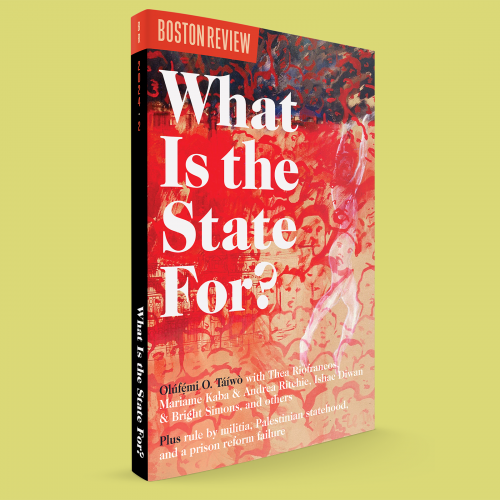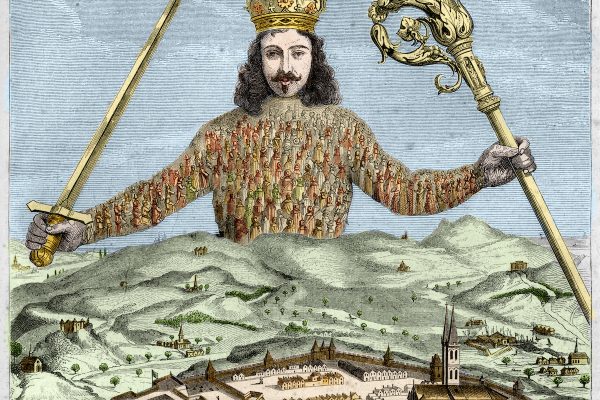During a virtual convening hosted last year by Interrupting Criminalization, the organization we cofounded in 2018, abolitionist scholar and geographer Ruth Wilson Gilmore offered a provocation central to the question of how abolitionist organizers relate to the state: How do we, as a society, accomplish “big things” with and for people we don’t know or necessarily like?
Certainly, salvaging the fate of a planet careening toward climate collapse driven by fossil fuel interests is primary among those big things we must urgently work across difference on a global scale to accomplish. Our success in doing so, as Táíwò argues, is a precondition not only for our collective survival but also for achieving many liberatory goals, including futures free from violence, surveillance, policing, prisons, and punishment. As we are witnessing in horrific real time, access to rapidly diminishing natural resources and livable space is increasingly intensely and violently policed, from the shores of Gaza to the gold and mineral fields of the Congo to the borders of the Global North, while resistance to the forces driving extraction, climate collapse, and their consequences is increasingly violently repressed.
Táíwò suggests that these practical realities require us to, in short, stick with states: adopting a two-step strategy to first secure divestment from the fossil capital that currently structures nation-states and then to transform states into entities that structure societies committed to the survival of all. There is no question that in order to secure a just and peaceful future on this planet, divestment from fossil capital—and racial capitalism as a whole—is necessary. In 2018, for example, South African organizers described to a U.S. solidarity delegation how the failure of the emerging post-apartheid state to divest from capitalism created conditions for perpetuating policing practices reminiscent of its predecessor. This was made grimly clear in the 2012 Marikana massacre, when South African police mowed down dozens of striking Black miners, echoing apartheid-era tactics for suppression of Black labor organizing. While states remain central sites of contestation, the capital interests that control and exert power within and beyond state structures and borders are produced and perpetuated through policing. Divestment from fossil capital therefore conditions possibilities for futures beyond policing and punishment.
Yet any effort to mobilize the existing state apparatus to secure divestment from fossil capital and investment in creative capacities toward global energy transition must attend to and resist the ways carcerality inevitably barges into structures we build and rely on to collectively accomplish things big and small, from community institutions to planetary action. How do we contemplate imposing consequences for failure to adhere to collective values or goals, or to make choices consistent with our collective survival, without veering into criminalization or collective punishment? Criminalization operates in similar ways, whether it targets individual or state actors: those with the least power will experience the brunt of punishment regimes while the powerful largely escape them. Enforcement of international law and environmental regimes is no different.
In essence, creating conditions conducive to collective survival requires imagining and enacting systems of governance that will bring about not just divestment from fossil fuel interests, but also divestment from carceral logics. Otherwise the steps we take will not, in fact, bring us closer to the abolitionist futures we are fighting for.
As we argue in No More Police: A Case for Abolition, there is no blueprint for the abolitionist futures we’re imagining and creating; we are building the world anew. There’s also no consensus among prison abolitionists about what shapes these futures should take—or how we will get there. The path toward restructuring a society and economy from one built on scarcity, shaped by racial capitalism, and sustained by policing to one built on abundance, sustainable economies rooted in collective care, and transformative justice requires us to grapple and sit with many unknowns and tensions around the specifics of this transformation. As abolitionists, how do we get from where we are to the society we want to create while navigating the pitfalls along the way?
Central to this question is our relationship to the state. Should abolitionist organizers fight to move money and power from police and prisons to other state institutions like public housing, education, and health care—even though they also serve as disciplining arms of the carceral state —or do we need to work outside the state, in community-based institutions and programs? In other words, how can we extract resources currently devoted to surveillance, policing and punishment and put them toward meeting community needs and building safety without becoming a cog in a carceral apparatus? What kinds of decision-making processes do we want around how collective resources are generated and spent? How should we govern ourselves and relate to each other? In short, what is the role of the state in abolitionist presents and futures?
Abolitionists continue to grapple with questions around which economic systems and forms of governance will make space for and bring us closer to abolitionist futures. We don’t all agree, nor do we have all the answers. That is not only OK; it can be generative, creating necessary space for robust debates, sharpening our analysis, and inviting experimentation, evaluation, study, and practice that will bring us closer to our vision. Contradictions and tensions are inherent in the work of worldbuilding, and many will remain unresolved, even as new contradictions emerge from the actions we take. The work of abolition is necessarily always unfinished and in process. It is essential, however, that we work together to find ways to navigate these tensions that build greater, more authentic, and grounded coherence rather than dissension and fragmentation that ultimately disempower us.
Answering these questions requires us to define what we mean by “the state.” Ruth Wilson Gilmore and Craig Gilmore describe the state as “a territorially bounded set of relatively specialized institutions that develop and change over time in the gaps and fissures of social conflict, compromise, and cooperation.” In other words, the state is a collection of institutions and practices shaped by the people who inhabit and enact them, as well as by the historical moment, place, and conditions in which they evolve, rather than a fixed structure disconnected from the people who make it up. No matter what shape states take, they represent “a claim to a right to rule on behalf of society at large”—meaning they create and enforce rules and maintain a monopoly on the legitimate use of violence to do so. They also generally have and enforce territorial limits and borders within which state institutions operate and these rules apply.
According to the Gilmores, the state secures “a society’s ability to do different things,” “through the exercise of centralized rulemaking and redistribution.” Those things include extraction, taxation, military conscription, regulation, criminalization, surveillance, and making and facilitating profit. But they can also include building public infrastructure, providing for public education, and offering support in meeting basic needs. These functions are neither fixed nor mutually exclusive—criminalization can and does happen through state provision of public education, public health, and social programs.
This forces us to confront some larger questions: Can the state perform any of these functions without the violence of surveillance, police, punishment, coercion, and abandonment? If so, which ones? And if not, does rooting out policing require dismantling states in their entirety and putting in place different systems of governance and resource distribution?
Police and policing, and the social and economic order they manufacture and make possible, are so deeply imbricated in our conceptions and experiences of the state that it is difficult for those of us living and struggling in settler colonial carceral capitalist states to imagine them otherwise. Under what abolitionist scholar Jackie Wang describes as “carceral capitalism,”
the state is inherently repressive. As an enforcer of contracts, it secures access to land, and represents the interests of the settler propertied class; it has a self-preserving reflex that always results in the crushing of revolution and political dissent.
Drawing on experiences studying and representing clients in state administrative systems, Dean Spade similarly characterizes the state as “a technology of extraction” that sorts, manages, and controls people, privileging some and criminalizing and abandoning others. Are these functions characteristics of carceral, racial capitalist states or inherent to all state formations? Is there an abolitionist form of “stateness” that can be mobilized to secure our collective survival and that of the planet on which it depends, or are any efforts to control the state doomed to perpetuate structures that are inherently carceral?
Discerning whether surveillance, policing, punishment, and extraction are inherent to state-based governance is not simply a theoretical pursuit—it has real-life implications for the goals and strategies of abolitionist campaigns. These contradictions don’t have to immobilize us. Instead, we can ask ourselves what possibilities emerge if we move beyond the dichotomy of capturing or dismantling the modern Western state. What if our goal is not to seize the carceral state in an effort to transform it, but to seize power and resources from it to create conditions under which new economic systems and forms of governance can emerge? Recapturing the resources the state has extracted is a legitimate, and arguably necessary, means of both reducing the misery created by racial capitalism and creating conditions for abolition. And the process of securing direct, collective decision-making power over those resources is a means of practicing new forms of governance.
Practicing new forms of accountability to collective values through transformative justice rather than ceding power to the state to intervene in instances of conflict, harm, and need can lead us to better understand what individual and collective transformation is required to build abolitionist futures. Understanding the carceral state as a social relation helps us to see, in the words of nineteenth-century social anarchist Gustav Landauer, that it “is a condition, a certain relationship between human beings, a mode of human behavior; we destroy it by contracting other relationships, by behaving differently.” Ruth Wilson Gilmore describes this process as rehearsal of life beyond the current carceral state.
As Grace Lee Boggs urges us in The Next American Revolution (2011), “we want and need to exercise power, not take it,” as we transform ourselves to transform the world. There is no single way to go about this, but Boggs points to the creation of new community institutions “that give us ownership and control over the way we make our living, while helping us to ensure . . . well-being of the community and the environment,” and organizing that supports the “creation of more human human beings and more democratic institutions.”
For us, two things are clear: one, that the carceral, racial capitalist state cannot be reformed or captured and repurposed, and two, that abolition and racial capitalism cannot coexist. While the role of the state in abolitionist futures is in question, abolition in the now invokes a broad strategy to dismantle the carceral state and to undo settler colonialism, racial capitalism, and imperialism.
The immediate task, then, is assessing what work needs to be done to create the conditions for something new to emerge. This requires that we grapple with practical questions, such as how to organize at the community level at a scale necessary to meet collective needs in a global society in ways that do not replicate the policing functions of the state. What liberatory mechanisms of individual and mutual accountability can we imagine and practice within these projects? How might we preserve collective resources for the common good against those who would seek to accumulate them for private gain or put personal preference above collective goals? How do we navigate strategic questions focused on limiting the state’s power to do harm and maximizing its capacity to meet collective needs while practicing and fighting for more participatory forms of governance?
As we do so, we must be wary of the traps inherent in making demands that give the state power over their realization. In other words, we need to go beyond winning concessions from the state—we need to develop capabilities to govern ourselves, and our planet, otherwise.
Independent and nonprofit, Boston Review relies on reader funding. To support work like this, please donate here.









